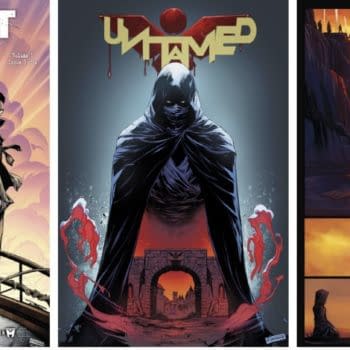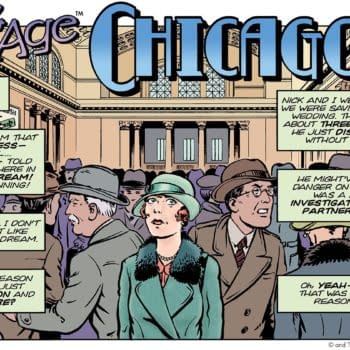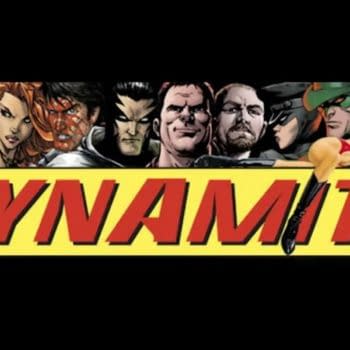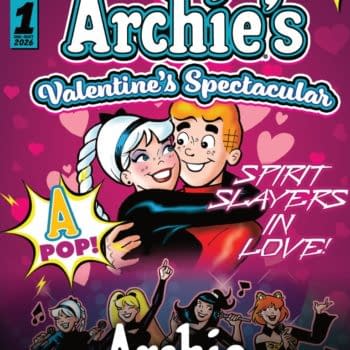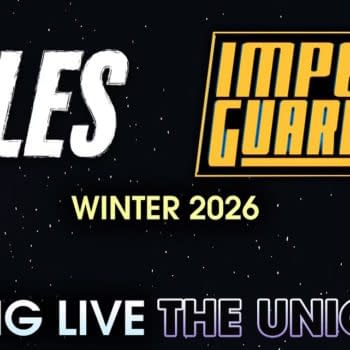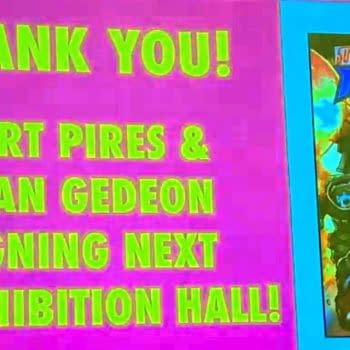Posted in: Comics | Tagged: Aaron Lopresti, Comics, entertainment, NYCC, Power Cubed
Aaron Lopresti Talks Power Cubed And Fun In Comics At NYCC '15
At New York Comic Con last week, I spoke with esteemed comic book writer and artist, Aaron Lopresti. Together, the two of us spoke about his most recent work for Dark Horse, Power Cubed.
OK: What would you say to get someone interested in Power Cubed?
AL: The PR person has a great tag line that I wish I could take credit for creating. It says on the promo stuff, "What if you could create anything?". That to me is a pretty great hook. It's not 100% accurate, because what the kid has is a power cubed that's a matter re-arranger, so he can take something and change it into something else, but he can't create something out of thin air. He can take a car and turn it into a robot or a refrigerator. He does that in the comic; I'm going to quit giving away the comic! That's kind of the idea, and I thought it was a great tag line.
OK: Having read the first issue myself, I noticed the comic is very light-hearted and whimsical. What inspired you to write Power Cubed in such a way?
AL: I'm not a big fan of the grim direction that comics have gone. I think there's a place for that, because there's certainly an audience for that kind of stuff, but it seems like it's pervasive over the entire industry. The reason I got into comics in the first place is I remember reading when I was a kid, like most of us, and when I grew up in the seventies reading them, it was fun stories. Exciting stories. There was what I would consider at that time…comics had dealt with adult situations like death and romance and things like that, but they weren't gratuitous and they weren't graphic in nature. At least in my opinion, my perception as a kid, if I was reading Spider-Man for example, you had the super villain stuff, but then he always had his soap opera, what was going on with Mary Jane or what was going on with Gwen Stacy or whoever. They got into that adult romance type thing, but we never saw what happened behind the bedroom door and the violence was never someone getting their head lopped off and blood spewing everywhere. I always looked at it like this is a comic book that I, as a twelve year old, could read, but also something an adult could read. It wasn't dumbed down. It didn't go too far. It left a lot to your imagination, like a good Hitchcock film. It wasn't dumbed down.
I think one of the problems in comics is there's not a lot of stepping-on books for kids. What are we doing to the industry? We're placating all the thirty-year olds to the forty-year olds to the fifty-year olds that are my age that grew up reading comics, but what are we doing that's attracting new readers into pulling them away from video games? I've always thought it was a mistake to do an adolescent line, to do Wolverine, but it's dumbed down Wolverine for little kids, when you can do Wolverine, just don't make it as graphic so that it's successful. So I wanted to do a comic that I felt adults could read, find the humor in and appreciate it, but also there was nothing offensive in it that a twelve-year old couldn't take home and have mom go, "what are you reading!?" That was why I id it the way I did it. I don't feel like there's enough fun and enjoyment in comics, at least not how I remember them.
OK: You've ben working in comics for a while, so why write Power Cubed now?
AL: I hate to say this, but I turned fifty last year and I started thinking that I've got a folder, a file cabinet (doesn't that date me, it's not on a computer) full of story concepts and ideas. At some point I'm going to get so old that DC or Marvel is going to say, "We don't want to use this guys anymore," and then what do I have to show for it? Nothing. I just felt like I needed to start making a concerted effort to find ways to get creator-owned material out in the market place so that I have something that's mine. Three yeas ago, at this show, Mike Richardson came by my table in Artist Alley and we were talking and he said, "Hey, if you want to do a creator-owned book at some point, and got something, let me know, because we're trying to do more of that kind of thing," and I said, "Well, Mike, as a matter of fact I do have something". I was then dead set on saying, "I'm going to do this," and not just talk about doing it, but do it. It's taken three years to get to this point, because you do these as side projects and you do them when you can work on them, and while you're doing your painting work. I was determined to start getting it out there before you get so old you become irrelevant, you know, you're living in a cardboard box going, "remember when I used to draw Wonder Woman?" So I have other stuff planned as soon as Power Cubed is done. If it sells well enough and is popular enough, I would certainly like to do a sequel to it, but if that were not the case I have other ideas. I want to keep a steady flow of creator-owned stuff out in the market, steady as I can make it, while I'm doing all this other stuff.

AL: It's a four-issue mini-series initially and the storyline with Doctor Cruel is wrapped up in the four-issue storyline, but the door is wide open for further stuff. As you see when you read the second issue, there's more going on, I want to say as a background story, that can be developed in another mini series; I can't tell you what it is! I don't want to spoil my own book!
OK: How would you say your writing and artwork has changed and evolved since your early work on Sludge?
AL: I went to film school originally, and that's where I got most of my writing training and in writing screenplays, which is very different from writing a novel, but very similar to writing a comic book script, so I've always felt very comfortable in that role. The one thing you realize, and they told us this at film school, but when you're twenty or twenty-one you're like, "what do you know?" is that it's hard to be a good writer until you have something to write about. It translated to me that if you have life experience that you can put into something, that makes it more credible and more believable, because you've actually experienced it yourself.
As opposed to when I was at film school I wrote some script about some kid that went nuts and started opening fire, talking about torn from the headlines today, but it wasn't back then, but I had no concept of what I was talking about. It was just this cinematic idea of what it'd be like if this kid lost it; it was kind of like my version Taxi Driver, watered down. I guess to make a long story short, to understand a character, and how to use character effectively, and not just come up with this high concept drama idea, how do you deal with the characters and how the characters deal with the situations they're faced with and how do you show growth of a character; things like that. When I did the couple issues of Sludge you're talking about, it was just Sludge fighting a monster; there was a little humanity in there, maybe, but that really wasn't the focus. Hopefully I'm much better at that now, at making the stories more full. I'm not just saying it's a funny comic, but a funny comic with some heart to it.
OK: What does the art/craft of writing or storytelling mean to you?
AL: I would describe it more as storytelling, than I would as writing, because to me a writer is someone who writes novels, or that type of thing. I don't really think of what I'm doing as that. I think of writing, at least in the format we're talking about, as storytelling. In being an artist too, it's always a combination of both. How do I come up with a story that's interesting, but also visually engaging? It's taking your reader on a journey and you want to make sure they enjoy the ride. There's nothing worse than going to a movie, paying ten bucks for a movie, and saying "That sucked. I didn't enjoy it at all." To me, it's that enjoyment factor. Not everything you're going to read or see is going to give you an Indiana Jones feel when you're done, but I love that feeling and that's the journey I want to take people on when I do stuff that I'm writing myself. I want you to be swept away for whatever amount of time it is that you're involved in the book and have you come away feeling good having spent that time with it.
Octavio Karbank is a writer and bona fide Whovian. Living in Massachusetts, you can find him on Twitter @TymeHunter and his blog www.cozmicventures.com







